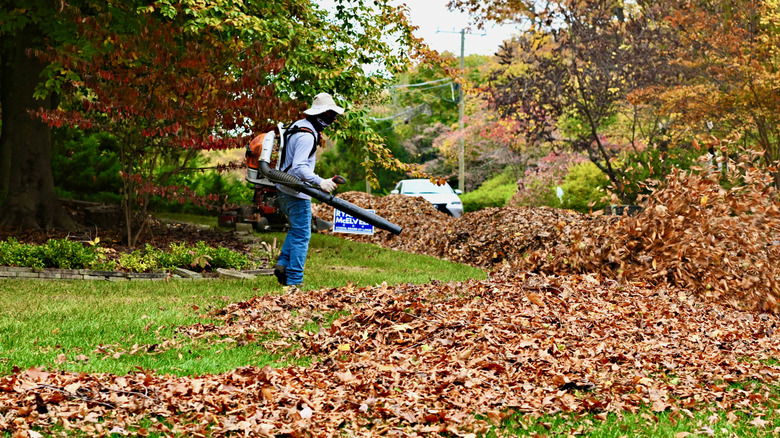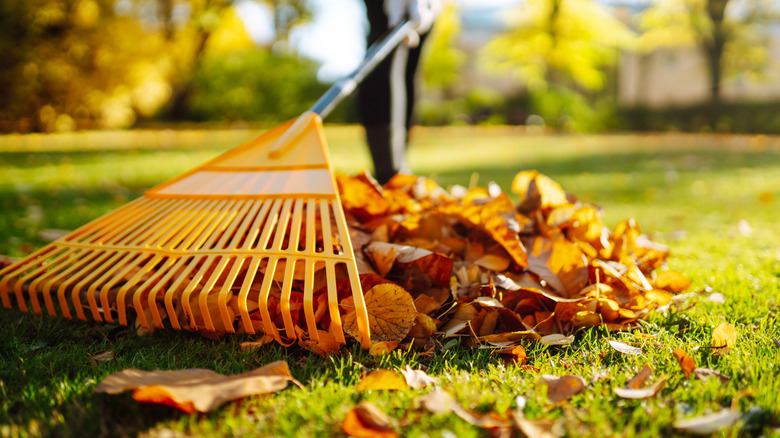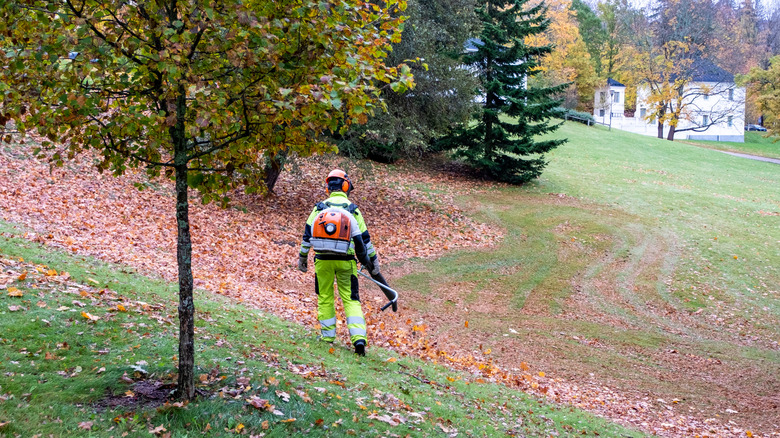Everything Maryland Residents Need To Know About The New Gas-Powered Leaf Blower Bans
If you live in Maryland and have been considering buying and using eco-friendly alternatives to gas-powered leaf blowers, it might be a good time to make the switch. Many local governments in the state of Maryland have outlawed the use of gas-powered leaf blowers, and many of the bans start in mid-2025, meaning local residents need to be prepared.
In the city of Annapolis, Maryland, the ban on gas-powered leaf blowers began on April 1, 2025, after being passed in February 2024. City officials can assign municipal fines to those who violate the ban on these outdoor power tools. Smaller Maryland cities, like Hyattsville and University Park, have bans too. Montgomery County in central Maryland, one of the most affluent counties in the United States, passed a similar ban that begins on July 1, 2025. The penalty for a first-time violation in Montgomery County is a $500 fine, and residents of the county have been unable to purchase new gas-powered leaf blowers since July 1, 2024.
Maryland's state legislature considered a bill during the 2025 legislative session that would have banned gas-powered leaf blowers throughout the state. It would have prevented all Maryland retailers from selling the machines beginning at the start of 2027, slowly phasing out the use of gas-powered models between 2027 and 2030. However, the bill did not make it out of committee in 2025. Here's what Maryland residents who live in the local areas with bans can do to remain in compliance.
Options for leaf removal for Maryland residents
If you live in an area of Maryland that has a gas-powered leaf blower ban, your best option might be to consider a battery-powered or corded electric leaf blower. When looking for a new leaf blower that runs on a battery, some of the best leaf blower brands for your lawn include Ryobi, Greenworks, Ego, and Husqvarna.
An electric-powered leaf blower has quieter operation, with noise levels similar to what you'd experience with a vacuum cleaner. The battery or corded blower runs more quietly because it doesn't constantly maintain a high power output while waiting for you to use it. A gas leaf blower could reach 100 decibels or more at the point of operation. A 100-decibel sound could cause hearing damage with as little as 15 minutes of exposure and is equivalent to the noise caused by a train or snowmobile. Electric models usually range from 65 to 85 decibels of noise during operation. Additionally, the difference in gas versus electric noise levels becomes more noticeable at 50 feet from the power tool, according to an analysis by Consumer Reports, which means gas-powered models create more noticeable noise for the rest of neighborhood.
Manual-powered leaf removal options include a rake, broom, or walk-behind lawn sweeper. You can keep your lawn tidy with a lawn sweeper and receive a little exercise at the same time. Manual rakes have some advantages compared to using a blower, such as being much cheaper to buy and requiring minimal maintenance work. However, a blower will make the job go faster and requires less physical effort than a rake.
Reasons behind the banning of gas leaf blowers in Maryland
In addition to the current and upcoming Maryland bans in Montgomery County, Annapolis, University Park, and Hyattsville, the city of Baltimore has approved a ban on gas leaf blowers, but it doesn't go into full effect until after 2026. Residents and landscaping companies can use the gas blowers from mid-October through mid-December in 2025 and 2026.
These bans aren't limited to Maryland. More than 200 U.S. cities and several states have significant restrictions or outright bans of gas leaf blowers in place. California has banned the sale of all gas-powered lawn equipment as of the start of 2024. On the flip side, states like Texas and Florida are passing laws that allow residents to continue to have the right to use gas-powered leaf blowers.
Why are cities and states banning these types of outdoor power tools? Noise is a significant issue with these devices, as they disturb neighbors and violate local noise ordinances. For example, Annapolis is limiting noise levels to 65 decibels in residential areas during the day (and 55 decibels at night), making gas-powered outdoor tools too loud. Additionally, the exhaust from these outdoor power tools is toxic and can disturb natural habitats for animals. Montgomery County is one jurisdiction that mentions wanting to ban or restrict the use of gas-powered lawn equipment to cut down on the use of gasoline, citing 2018 data that shows people in Maryland use an estimated 72 million gallons of gasoline on lawn and garden maintenance each year.


